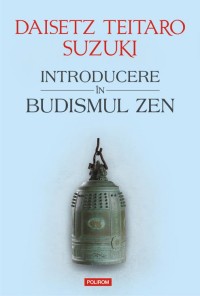 Japanese Language online course. Japanese Language online course.
For information please email us or complete the form in the contact page.
|
|
 |
| |
 An Introduction to Zen Buddhism An Introduction to Zen Buddhism
Author: Daisetz T. Suzuki
Translated by Neculai Amalinei
Polirom Publishing House, Iasi, 2015.
152 pagini, 135x200 mm
ISBN: 978‑973‑46‑4800‑9
Price: 24.95 RON
:: Order online ::
|
 |
The articles collected here were originally written for the New East, which was published in Japan during the 1914 War under the editorship of Mr. Robertson Scott. The editor suggested publishing them in book-form, but I did not feel like doing so at that time. Later, they were made the basis of the First Series of my Zen Essays (1927), which, therefore, naturally cover more or less the same ground.
Recently, the idea came to me that the old papers might be after all reprinted in book-form. The reason is that my Zen Essays is too heavy for those who wish to have just a little preliminary knowledge of Zen. Will not, therefore, what may be regarded as an introductory work be welcomed by some of my foreign friends?
With this in view I have gone over the entire MS., and whatever inaccuracies I have come across in regard to diction as well as the material used have been corrected. While there are quite a few points I would like to see now expressed somewhat differently, I have left them as they stand, because their revision inevitably involves the recasting of the entire context. So long as they are not misrepresenting, they may remain as they were written.
If the book really serves as a sort of introduction to Zen Buddhism, and leads the reader up to the study of my other works, the object is attained. No claim is made here for a scholarly treatment of the subject-matter.
The companion book, Manual of Zen Buddhism, is recommended to be used with this book.
Daisetz. T. Suzuki.
Kamakura, August 1934
DAISETZ T. SUZUKI (1870-1966) was a Japanese author of books and essays on Buddhism, Zen and Shin that were instrumental in spreading interest in both Zen and Shin (and Far Eastern philosophy in general) to the West. Suzuki was also a prolific translator of Chinese, Japanese, and Sanskrit literature. Suzuki spent several lengthy stretches teaching or lecturing at Western universities, and devoted many years to a professorship at Otani University, a Japanese Buddhist school.
His essays on Zen were influential, making Zen known in the West for the very first time:
Essays in Zen Buddhism: First Series (1927).
Essays in Zen Buddhism: Second Series (1933).
Essays in Zen Buddhism: Third Series (1934).
An Introduction to Zen Buddhism.
The Training of the Zen Buddhist Monk.
Manual of Zen Buddhism.
Written in a lively, accessible, and straightforward manner, An Introduction to Zen Buddhism is illuminating for everyone interested in Zen culture. Dr. Suzuki provides a complete vision of Zen, which emphasizes self-understanding and enlightenment through many systems of philosophy, psychology, and ethics. This book provides, along with Dr. Suzuki's Essays and Manual of Zen Buddhism, a framework for living a balanced and fulfilled existence through Zen.
|
|
|